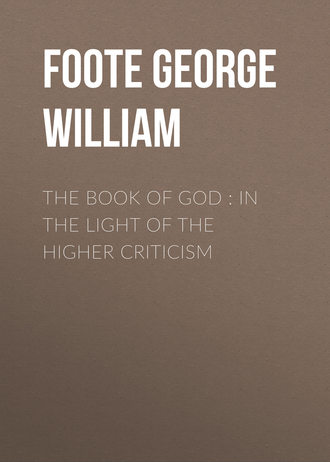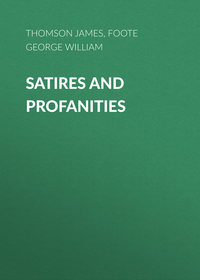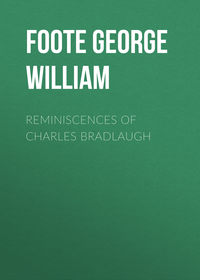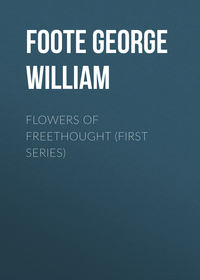
The Book of God : In the Light of the Higher Criticism
The more astute Higher Critics avoid such dangers. They resort to a theory that combines mystery and plausibility, by which they hope to satisfy believers on both sides of their natures. Dr. Farrar tells us that Christ, to become a man, emptied himself of his glory; and that this "examination" involved the necessity of speaking as a man to men. This position is perhaps best expressed by Canon Gore: —
"It is contrary to his whole method to reveal his Godhead by any anticipations of natural knowledge. The Incarnation was a self-emptying of God to reveal himself under conditions of human nature, and from the human point of view. We are able to draw a distinction between what he revealed and what he used…Now when he speaks of the 'sun rising' he is using ordinary human knowledge. Thus he does not reveal his eternity by statements as to what had happened in the past, or was to happen in the future, outside the ken of existing history. He made his Godhead gradually manifest by his attitude towards men and things about him, by his moral and spiritual claims, by his expressed relation to his father, not by any miraculous exemptions of himself from the conditions of natural knowledge in its own proper province. Thus the utterances of Christ about the Old Testament do not seem to be nearly definite or clear enough to allow of our supposing that in this case he is departing from the general method of the Incarnation, by bringing to bear the unveiled omniscience of the Godhead, to anticipate or foreclose a development of natural knowledge."9
This would perhaps be sublime if it were only intelligible. We are not surprised at Dr. Driver's turning away from the metaphysics of this theory. His mind is cast in a more sober and practical mould. It is enough for him that the aim of Christ's teaching was a religious one; that he naturally accepted, as the basis of his teaching, the opinions respecting the Old Testament that were current around him; that he did not raise "issues for which the time was not yet ripe, and which, had they been raised, would have interfered seriously with the paramount purpose of his life."10
This is excellently said. It is just what Paley might have written in present-day circumstances. But it contains no note of the supernatural. It deals with Jesus as a mere man, who did not disclose all the information he possessed, but sometimes veiled his knowledge for temporary reasons. It leaves his Godhead in the background. It does not recognise how easy it was for Omnipotence to act differently. And when the Higher Criticism points out that the human mind could, in the course of time, free itself from errors as to the authorship and credibility of the Old Testament, it forgets that Jesus Christ, by accommodating himself to those errors, perpetuated them. His authority was appealed to for centuries – it is appealed to now – in favor of falsehood. Nor is this falsehood trivial and innocuous. It has been extremely harmful. It has fostered a wrong view of the Bible, it has prolonged the reign of superstition, and thus hindered the growth of true civilisation. This is an impeachment of the moral character of Jesus. It is a confession that he served a temporary object at the expense of the permanent interests of humanity. We feel constrained, therefore, to admit the force of the words of Canon Liddon: —
"We have lived to hear men proclaim the legendary and immoral character of considerable portions of those Old Testament scriptures, upon which our Lord has set the seal of his infallible authority. And yet, side by side with this rejection of Scriptures so deliberately sanctioned by Christ, there is an unwillingness which, illogical as it is, we must sincerely welcome, to profess any explicit rejection of the Church's belief in Christ's divinity. Hence arises the endeavour to intercept a conclusion, which might otherwise have seemed so plain as to make arguments in its favor an intellectual impertinence. Hence a series of singular refinements, by which Christ is presented to the modern world as really Divine, yet as subject to fatal error; as Founder of the true religion, yet as the credulous patron of a volume replete with worthless legends; as the highest Teacher and Leader of humanity, yet withal as the ignorant victim of the prejudices and follies of an unenlightened age."11
Canon Gore devotes several pages of his Bampton Lectures to this subject, but he does not fairly answer the straightforward objections raised by Canon Liddon. Dealing with the references of Jesus to the Mosaic authorship of the Pentateuch, and to Jonah's three days' entombment in the whale's belly, and with the argument that this endorsement by Jesus "binds us to receive these narratives as simple history," he blandly declares, "To this argument I do not think that we need yield." Of course not. There is no need to yield to anything you do not like; for this is a free country, at least to Christians. But what is the logical conclusion? That is the point to be decided. Canon Gore does not face it; he merely expresses a personal disinclination. Subsequently he pleads that "a heavy burden" should not be laid on "sensitive consciences," and that men should not be asked "to accept as matter of revelation what seems to them an improbable literary theory." But this again is a personal appeal. These men must be left to attend to their own consciences. They have no right to demand a suppression of truth, or a perversion of logic, for their particular advantage.
When a candid reader has finished all that the Higher Criticism has to say on this matter, we believe he will be filled with a sense of its insincerity. It never strikes a note of triumph, or even a note of conviction. It is timid, furtive, and apologetic; and shelters itself against reason by plunging into mystery. In place of all the difficulties it removes it sets up a colossal one of its own manufacture; the difficulty, to wit, of conceiving that God himself lent a sanction to grave and far-reaching error as to his own Word; or what would inevitably be regarded as a sanction, and would necessarily delay for many hundreds of years the discovery and reception of the truth. The Higher Criticism, in short, has supplied a new argument against the deity of Jesus Christ.
X. THE BIBLE AND THE CHURCH OF ENGLAND
Dr. Farrar's book has naturally given offence to the more orthodox Christians. Clergymen like "Father" Ignatius stigmatise him, and indeed all clerical exponents of the Higher Criticism, as wolves in sheeps' clothing, who eat the Church's meat and do the work of "infidelity." We are not surprised, therefore, that some reassurance has been deemed necessary; nor astonished that it took the form of a popular announcement in the newspapers. Some months ago – to be accurate, it was in September – the following paragraph went the round of the press: —
"Dean Farrar and the Scriptures. – A correspondent called the attention of Dean Farrar to the fact that Atheistic lecturers are in the habit of affirming that he does not believe in the Bible (referring to his works as a confirmation of the statement), and observed that, if such a grave assertion were allowed to be propagated without contradiction, the young and the ignorant might be deceived by it. The Dean, who is at present staying in Yorkshire, replied as follows: 'The statement to which you refer is ignorant nonsense. The doctrine of the Church of England about Holy Scripture is stated in her Sixth and Seventh. Articles, and that doctrine I most heartily accept."
This strikes us as a rather paltry evasion. The Sixth and Seventh Articles of the Church of England do not state the full Christian belief as to the Bible, but only the Protestant belief as against that of the Church of Rome. They emphasise two points, and two points only: first, that the Scriptures contain all that is necessary to salvation, so that no man is at the Pope's mercy for a seat in heaven; second, that fourteen books of the Roman Catholic Bible are apocryphal, and cannot be used to establish any doctrine. The general Christian view of the Bible, common to Catholics and Protestants, is taken for granted, as it had not then been brought into controversy. There is one word in the Sixth Article, however, which may be commended to Dr. Farrar's attention. The last clause explains what is meant by "Holy Scripture," and runs as follows: – "In the name of the holy Scripture we do understand those Canonical Books of the Old and New Testament, of whose authority was never any doubt in the Church." Now, unless Dr. Farrar means to juggle with the word "authority" – and we do not doubt his capacity for doing so – it is idle for him to say that he believes in the Bible according to these terms. He does not believe, for instance, in the "authority" of the book of Jonah; on the contrary, he believes that Jonah did not write it, and that it is not history, but romance, from beginning to end. If this is believing in the Bible, then Atheistic lecturers believe in it as well as Dr. Farrar. He does not believe that Jonah spent three days in a whale's belly – nor do they; he does not believe that Jonah's deep-sea adventure was a prefigurement of the burial of Jesus Christ – nor do they; he does not believe that the Jonah story is any the truer because Jesus Christ really or apparently believed it – nor do they; he simply believes that the story's moral is a good one, as far as it represents people who are not Jews as entitled to consideration – and so do they. Substantially there is not the smallest difference between them. The only discernible difference is a hypothetical one. Dr. Farrar claims that the book of Jonah is inspired. But he also claims that everything good and true – that is, everything worth reading – is inspired. "Very well then," the Atheist may reply, "I agree with you still, in substance. The only point in dispute between us is whether there is a God who interferes with the natural course of things, either in the external world or in the human mind. But on your definition of the word inspired, this makes no particular difference to any one book or collection of books. And unless you alter (and narrow) your theory of inspiration, our difference begins outside, not inside, the library – and is, in brief, not practical, but metaphysical."
But let us return to Dr. Farrar's method of proving his sufficient orthodoxy; and let us tell him that if he will only pursue it far enough, he may get rid of the Bible altogether.
Suppose we take Pearson's classic Exposition of the Creed, and open it at his address "to the Reader." In the second paragraph he writes as follows: – "The Creed, without controversy, is a brief comprehension of the objects of our Christian faith, and is generally taken to contain all things necessary to be believed." Now this Creed does not mention the Bible at all. A heathen might read it, and never infer from it that there was such a thing as the Scriptures in existence. What then is to prevent Dr. Farrar, or some more audacious clergyman, from saying that he does not believe in the Bible, as it is nowhere laid down as necessary to be believed; but that his orthodoxy is nevertheless unimpeachable, because he "most heartily accepts" the Catholic and Apostolic Creed which is "without controversy" an accurate compendium of the Christian faith, and which, being prescribed in the Prayer Book, is of course binding – and is alone binding – on every loyal son of the Church of England?
Dr. Farrar claims, as a clergyman, what he calls a "Christian liberty" in dealing with the Bible; although, if God has indeed spoken in the Bible, it is difficult to see what liberty a Christian can have but that of absolute belief and obedience. In a lengthy footnote of his volume which we have been criticising, he refers to the famous "Essays and Reviews Case," and the decisions of the judges in the Court of Arches and in the Privy Council. Dr. Lushington laid it down that: "Provided the Articles and Formularies are not contravened, the law lays down no limits of construction, no rule of interpretation, of the Scriptures." Lord Westbury declared that the Sixth Article of the Church of England was based upon "the revelations of the Holy Spirit," and therefore the Bible might be denominated "holy" and be said to be "the Word of God"; but this was not "distinctly predicated of every statement and representation contained in every part of the Old and New Testaments." "The framers of the Articles," Lord Westbury added, "have not used the word 'inspiration' as applied to the Holy Scriptures, nor have they laid down anything as to the nature, extent, or limits of that operation of the Holy Spirit."
According to this sapient judgment, which perhaps is very good law, and covers all possible developments of the Higher Criticism, every member of the Church of England is bound to regard the Bible as containing "the revelations of the Holy Spirit," but is not bound to regard it as a work of "inspiration." A judge, with his legal spectacles on, is notoriously able to discriminate subtleties where laymen see only what is plain; and clergymen may take advantage of his preternatural sagacity, without being able in the long run to impose upon the common sense of the people, who will always look upon "revelation" and "inspiration" as interchangeable terms.
It is quite natural that Dr. Farrar should wish to get rid of this word "inspiration," since it can no longer be defined without danger. But we must remind him that, if it does not occur in the Church Articles, it certainly does occur in the Bible. "All scripture," Paul said, "is given by inspiration of God."12
And as the New Testament was not then in existence, Paul of course referred to the Old Testament. This was the "holy scriptures" which Timothy had "known from a child." And Peter is, if possible, more definite than Paul. He speaks of the "more sure word of prophecy," surer than the very voice heard by the three disciples on the mount of transfiguration. This "prophecy of the scripture" he declares to be never of "any private interpretation" – which means, according to the commentators, that it did not spring from any knowledge or personal conjecture in the prophet. Finally, he clinches his exposition by affirming that "holy men of God spake as they were moved by the Holy Ghost."13
According to the Sixth Article of the Church of England, both these epistles, bearing the names of Paul and Peter, are among the books "of whose authority was never any doubt in the Church." Dr. Farrar is therefore bound by them in logic and honor. He is not free to cast aside the Biblical term of inspiration nor free to minimise as he pleases the "moving" influence of the Holy Ghost in either the New or the Old Testament. As a clergyman of the Church of England, he assumes an unwarrantable freedom; a freedom which is no more sanctioned by her Articles than it is by the letter or spirit of the Scriptures. He departs entirely from the primitive and real position of Protestantism; namely, that the Bible is the absolute standard of faith and practice, and that, wherever it is dark or dubious, it must be interpreted by itself. He treads the via media of compromise and irrationality; neither going over to Rome, which claims to be inspired, like the Bible, and to be the vehicle of the living voice of God for the infallible interpretation of the written revelation – nor going over to Rationalism, which regards the Catholic Church as but a human institution, and the Bible as but a human composition. Believe that God has spoken, according to the words of Paul and Peter, and the Catholic theory is the only satisfactory one; disbelieve it, and there is no logical alternative but the most thoroughgoing Rationalism.
XI. AN ORIENTAL BOOK
Dr. Farrar stumbles, on one occasion, against the true theory of the Bible. Having to furnish an excuse, if not a justification, for the outrageous crudity of a good deal of its language, he reminds us that decorum changes with time and place. "The rigid external modesty and propriety of modern and English literature," he observes, "is disgusted and offended by statements which gave no such shock to ancient and Eastern readers." And he adds that "The plain-spokenness of Orientals involved no necessary offence against abstract morality." This is true enough, but the argument should be developed. What is urged in extenuation of the grossness of the Scripture is really applicable all round – to its mythology, its legends, its religion, its philosophy, its ethics, and its poetry. The Bible is an oriental book. And this one statement, when properly understood, gives us the true key to its interpretation, the real criterion of its character, and the just measure of its value.
It has been well remarked that the ordinary Christian in this part of the world appears to imagine that the Bible dropped down from heaven – in English. Even the expounders of the Higher Criticism, in our own country, read it first in their mother tongue; and although they afterwards read it in the original Greek, and sometimes in the original Hebrew, they are under the witchery of early impressions, and their apologetics are almost entirely founded upon the vernacular Bible. Thus they lose sight, and their readers never catch a glimpse, of the predominant element, the governing factor, of the problem.
All the Bibles in the world, like all the religions in the world, came from the East. "Not one of them," as Max Müller remarks, "has been conceived, composed, or written down in Europe."14
He classes the Pilgrim's Progress among the "many books which have exercised a far greater influence on religious faith and moral conduct than the Bibles of the world"; but Bunyan's originality was artistic and not religious; he absorbed the Puritanism of his age, and reproduced it in the form of a magnificent allegory. Religious originality does not belong to the Western mind, which is too scientific and practical. Every one of the fashionable crazes that spring up from time to time, and have their day and give place to a successor, is merely a garment from the old wardrobe of superstition. This is true of Theosophy, for instance; all its doctrines, ideas, and jargon being borrowed from India. "There are five countries only," Max Müller says, "which have been the birthplace of Sacred Books: (1) India, (2) Persia, (3) China, (4) Palestine, (5) Arabia." All come from the East, and all have a generic and historic resemblance. Not one of them was written by the founder of its religion. Moses did not write the Pentateuch, Christ did not write a line of the New Testament, Mohammed did not write the Koran, Zoroaster did not write the Avesta, the Buddhist Scriptures were not written by Buddha, and the Vedic hymns are far more ancient than writing in India. All these Sacred Books embody the accepted beliefs of whole peoples; all of them are canonical and authoritative; all contain very much the same ethical groundwork, in the form of elementary moral prohibitions; all of them are held to be of divine character; all of them become a kind of fetish, which is worshipped and obeyed at the expense of the free spirit of man, who is told not to be wise above what is written. Ecclesiastical or kingly authority has generally given these books their final form and character. Their establishment takes place in open daylight, but their origin is more or less shrouded in mystery. "It is curious," Max Müller says, "that wherever we have sacred books, they represent to us the oldest language of the country. It is so in India, it is the same in Persia, in China, in Palestine, and very nearly so in Arabia."15 According to Max Müller, the Veda was referred to in India fifteen hundred years before Christ. Consequently it precedes by many centuries even the earliest parts of the Bible: —
"The Vedic hymns come to us as a collection of sacred poetry, belonging to certain ancient families, and afterwards united in one collection, called the Rig-veda-samhitâ. The names of the poets, handed down by tradition, are in most cases purely imaginary names. What is really important is that in the hymns themselves the poets speak of their thoughts and words as God-given– this we can understand – while at a later time the theory came in that not the thoughts and words only, but every syllable, every letter, every accent, had been communicated to half-divine and half-human prophets by Brahma, so that the slightest mistake in pronunciation, even to the pronunciation of an accent, would destroy the charm and efficacy of these ancient prayers."16
With a slight variation of language, to suit the special circumstances, nearly all this would apply to the Bible.
Christianity, like Brahmanism, like Buddhism, like Mohammedanism, is a book religion. It is "God-given," or revealed, and its Bible has been elevated to a position of infallibility, above the reach of human reason, precisely like the Bibles of other oriental faiths. This sanctification of every thought and word and letter is declared by Max Müller to have been "the death-blow given to the Vedic religion," destroying its power of growth and change. A similar observation is made by Sir William Muir respecting the petrified gospel of the Koran: —
"From the stiff and rigid shroud in which it is thus swathed, the religion of Mohammed cannot emerge. It has no plastic power beyond that exercised in its earliest days. Hardened now and inelastic, it can neither adapt itself nor yet shape its votaries, nor even suffer them to shape themselves, to the varying circumstances, the wants and developments of mankind."17
How curious it is, after reading this strong passage, to come across a diametrically opposite one in the work of another eminent writer on the same subject. Professor Arnold closes his important book on the propagation of the Muslim faith with a reference to "the power of this religion to adapt itself to the peculiar characteristics and the stage of development of the people whose allegiance it seeks to win."18 Historically, it is perfectly certain that Mohammedanism has been found compatible with a high degree of civilisation. Many instances might be given, but a single one is sufficient. The Mohammedan civilisation in Spain was far superior to the Christian civilisation which, after terrible bloodshed and enormous destruction, was established upon its ruins. The truth is, that religions always change when they must change, and never otherwise. When the necessity arises, learned divines will always be found to make the requisite accommodations. This, indeed, is the explanation of the labors of Dr. Farrar and other exponents of the Higher Criticism. They are simply accommodating Christianity, and the Bible with it, to the serious changes that have taken place in educated opinion and sentiment, in consequence of the development of physical science, the progress of historical criticism, and the growth of moral culture. All the truth in Sir William Muir's impeachment of Mohammedanism is no less applicable to Christianity. The Bible, like the Koran, and like every other revelation, stereotyped old ideas, and gave them a factitious longevity. Dr. Farrar himself not only admits, but contends, that the Bible has been invoked against every advance in science, politics, and sociology. What more could be said of the Koran or any other sacred book?
Bring any oriental religion into Europe, and it must change or perish. Christianity is not true, as Mr. Gladstone and so many orthodox apologists have argued, because the Christian nations are at the top of civilisation. The Caucasian mind led the world before the advent of Christianity, and it is doing the same now. Christians are apt to forget that Greece and Italy are in Europe, and that Athens and Rome – two imperishable names in the world's history – were far-shining cities before a good deal of the Old Testament was written.
Keep any oriental religion in the East, however, and there is no saying how long it will last unaltered. Do not travellers talk of the unchanging East? The civilisation of China is almost what it was thousands of years ago. Syrian life to-day is like a picture from the Bible. And the old Orient, as Flaubert said, is the land of religions; and where Asia looks upon Europe, and the communication between them began of yore, you may sample all the faiths of antiquity. Flaubert remarked that the assemblage of all the old religions in Syria was something incredible; it was enough to study for centuries.19
Asia spawned forth all the great religions, and produced all the great revelations. Arabia is in Africa, but the Arabs are not Africans; they belong to the Semitic race, like the Jews, and the Koran embodies Jewish and other Semitic traditions.









